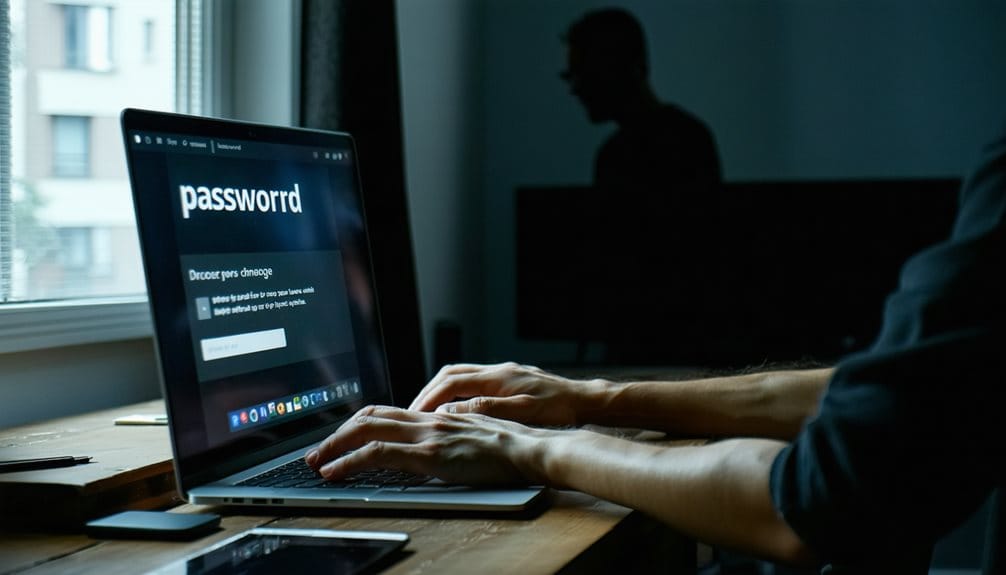Estate planning is about more than wills and inheritance. A binding financial agreement (BFA) can act as a planning [...]
Need some tips to protect their privacy?
We help you guide you through the entire Family Law process.
More than 100+ years of combined lawyer experience.
Protecting your online privacy during a divorce is crucial to keeping your personal and legal details safe. Imagine your online presence as a fortress – it’s time to strengthen those walls. Start by updating all your passwords; make them strong, unique and memorable. Think of them like a secret code only you know. Enable two-factor authentication for an extra layer of security. Keep an eagle eye on your accounts for any odd activity. Don’t overlook securing your email and digital communications. Just as you wouldn’t leave your front door open, ensure these channels are locked tight to prevent unauthorised access. Following clear steps to protect your online privacy during divorce can help safeguard sensitive information and give you peace of mind throughout the process.
Tighten your social media privacy settings too and resist the temptation to share personal tidbits about the divorce – think of it like airing your laundry in public.
Seeking legal advice can guide you in effectively managing these aspects, much like a seasoned navigator steering you through stormy seas.
By taking these steps, you’ll ensure a smoother and more secure transition during this challenging time.
How Can You Safeguard Your Online Presence During a Divorce?
To safeguard your online presence during a divorce, start by changing all your passwords to strong, unique ones and enabling two-factor authentication for added security. It’s essential to maintain privacy to protect your sensitive information from misuse, so make sure to adjust your social media privacy settings to limit who can see your posts. Regularly monitor your accounts for any unusual activity and consult a family law solicitor to address any concerns about your digital privacy.
Steps to Protect Your Digital Privacy
Divorce often involves numerous complexities and safeguarding your digital privacy is one of the most essential steps you can take to protect yourself. Start by updating passwords and security settings on all online accounts to guarantee they’re robust. Adjust privacy settings on social media to limit access. Monitor for unusual activity and consult legal guidance to proactively safeguard your online privacy during divorce.
Why Maintaining Privacy During Divorce is Crucial
Amidst the turmoil of a divorce, maintaining your online privacy becomes essential to protect sensitive information and preserve the integrity of legal proceedings. Unauthorised access to online accounts can lead to misuse of sensitive digital data, affecting outcomes. Safeguard your digital presence by adjusting privacy settings on your social accounts and seek guidance on protecting your online reputation. Address privacy concerns proactively to guarantee your interests remain secure.
Adjust Your Privacy Settings for Better Security
Safeguarding your online presence during a divorce requires immediate attention to privacy settings. Review and tighten account privacy settings to protect your privacy and digital assets. Set profiles to private, limit post visibility and disable location sharing. Regularly audit friend lists, removing potential risks. Temporarily deactivate accounts if necessary. These steps to safeguard your online information are essential in divorce cases to maintain your privacy effectively.
What Precautions Should You Take with Social Media Accounts?

When managing a divorce, start by reviewing your social media account settings to protect your privacy. Be cautious about what you share online, as any posts or updates can potentially be used in legal proceedings. Strengthen your social media accounts by using strong, unique passwords and regularly monitoring for any suspicious activity.
Protect Your Privacy by Reviewing Account Settings
To protect your privacy during a divorce, start by carefully reviewing and tightening the privacy settings on your social media accounts. Online privacy is essential when going through a divorce. Safeguard your privacy by reviewing the privacy settings to prevent unauthorised access. Enable two-factor authentication on all social media platforms. By taking proactive steps, you guarantee your information remains secure and visible only to trusted individuals.
Managing What You Share Online During Divorce Proceedings
During a divorce, being vigilant about what you share online is essential for protecting your privacy. Start by adjusting privacy settings to limit post visibility. Avoid sharing details about the divorce and regularly clean up your friend list. Monitor your social media accounts for unusual activity. These steps guarantee your digital privacy during your divorce and help you navigate a divorce without compromising access to your online life.
How to Safeguard Your Social Media Accounts
Many people underestimate the importance of safeguarding their social media accounts during a divorce. In this digital age, it’s essential to guarantee your privacy is protected. Here are steps to help you navigate this process:
- Adjust Privacy Settings: Limit visibility to trusted friends.
- Monitor Activity: Prevent unauthorised access to personal data.
- Deactivate Temporarily: Sometimes it’s better to stop using online services.
Why is Changing Your Passwords Important in a Divorce?

During a divorce, changing your passwords is essential to securing your online accounts against unauthorised access. Start by implementing strong passwords and enable two-factor authentication to add an extra layer of security. Regular updates to your passwords guarantee that any previously shared access is blocked, protecting your sensitive information from potential misuse.
Steps to Secure Your Online Accounts
Invariably, changing your passwords during a divorce is essential to protect your sensitive accounts from unauthorised access. By securing your online banking and digital presence, you can prevent unwanted intrusions. Consider these steps:
- Consult a family law attorney to understand how to safeguard your accounts and adjust passwords and security settings.
- Enable two-factor authentication for an extra layer of security.
- Regularly update passwords throughout the divorce process.
Implementing Two-Factor Authentication
Implementing two-factor authentication (2FA) is a critical step in safeguarding your online privacy during a divorce. It adds an extra layer of security to prevent unauthorised access, ensuring that your digital assets remain protected. In today’s digital age, handling digital security with care is paramount. Take proactive measures to protect your accounts by incorporating 2FA or biometric authentication, as recommended by your law group.
Best Practices for Strong Passwords
One of the first steps you should take during a divorce is changing your passwords. This protects your online privacy from unauthorised access. In today’s digital age, strong passwords are essential, especially during legal proceedings. To master password management, follow these steps:
- Use unique, complex passwords for each account.
- Enable two-factor authentication.
- Regularly update passwords to secure shared accounts.
How Can Legal Advice Help Protect Your Online Privacy?

Consulting a divorce lawyer can be essential in protecting your online privacy during a separation. They can help you understand your privacy rights under family law and suggest proactive steps to safeguard your personal information. By guiding you through securing digital assets and managing your online presence, a lawyer guarantees that your sensitive data remains protected throughout the divorce process.
Role of a Divorce Lawyer in Privacy Protection
Many divorce lawyers play a pivotal role in safeguarding your online privacy during divorce proceedings. They offer strategic advice on managing digital assets and understanding privacy laws. Key actions include:
- Assessing Online Behaviour: They explain how social media can impact custody and asset division.
- Implementing Security Measures: Change passwords and activate two-factor authentication.
- Documenting Evidence: Aid in preserving digital evidence essential in court to protect online accounts.
Understanding Family Law and Privacy Rights
As you navigate the complexities of divorce, understanding family law and your privacy rights becomes paramount. Legal advice guarantees you’re aware of online privacy protections and how digital evidence affects your case. Family law solicitors guide you in protecting sensitive information and crafting confidentiality agreements. They also inform you about the Online Safety Act 2021, safeguarding your rights when you post online.
Proactive Measures to Safeguard Personal Information
When you’re going through a divorce, taking proactive measures to safeguard your personal information becomes essential and legal advice can be invaluable in this process. In today’s digital age, it’s vital to protect your privacy. Seeking legal counsel helps you:
- Secure your phone and other devices—unauthorised access could be detrimental to your case.
- Manage who can view your posts on social media.
- Identify shared accounts—one of the first steps to securing personal data.
What Are the Risks of Not Protecting Your Email Account?

If you don’t protect your email account during a divorce, you risk unauthorised access to sensitive communications that could affect the outcome of your case. Your email often serves as a gateway to other important accounts, making it essential to secure your digital communication channels. Implement strong passwords and enable two-factor authentication to safeguard your information and maintain control during this critical time.
Securing Sensitive Information in Email Accounts
Securing your email account is essential during a divorce to prevent unauthorised access to sensitive information. If neglected, risks include:
- Compromised Legal Strategies: Unauthorised access can reveal confidential communications.
- Gateway to Other Accounts: Your email is a key to reset passwords, potentially giving access to financial and social media accounts.
- Identity Theft: Sensitive documents in emails can be exploited for fraud, leading to emotional and financial distress.
How to Safeguard Digital Communication Channels
While securing your email account is a significant step in protecting sensitive information, it’s equally important to safeguard other digital communication channels during a divorce. Neglecting this can lead to unauthorised access to personal data, which could be exploited in legal battles. Use strong, unique passwords and enable two-factor authentication. Regularly monitor your accounts for suspicious activity to prevent identity theft and unauthorised access.
Why Email Account Security is Vital During the Divorce Process
You might underestimate the importance of securing your email account during a divorce, but doing so can open the door to numerous risks. Without proper security, you expose yourself to:
- Unauthorised access to financial documents, risking your settlement.
- Compromised personal communications, which can influence legal outcomes.
- Identity theft, affecting 1 in 5 individuals during divorce, per the Identity Theft Resource Centre.
Take control by changing passwords and enabling two-factor authentication.

























